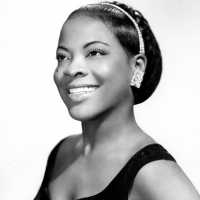Born in Chicago in 1929, singer LaVern Baker helped pioneer the R&B sound in the 1950s and released multiple hits with Atlantic Records including the famous "Tweedle Dee." After a USO tour left her alone in Asia in 1966, she spent 21 years in the Philippines managing a nightclub, returning to America later in life.
Early Career
Singer. LaVern Baker was born Delores Baker on November 11, 1929 in Chicago, Illinois. A descendant of former slaves whose family had migrated to Chicago from Mississippi in search of greater opportunity, Baker was raised primarily by her aunt, the jazz singer Merline Johnson who was best known as "The Yas Yas Girl." Memphis Minnie, the legendary blues singer and guitarist, was also one of Baker's aunts. Like many great African-American singers of her generation, Baker grew up singing in the choir of her Baptist church. Although small in stature, by the age of 12 she had developed a shockingly powerful voice and regularly served as her choir's leading soloist.
From almost the day she was legal (age 17 at that time), Baker set out to make a living as a performer in the cabarets of Chicago's South Side. Billing herself as "Little Miss Sharecropper," she performed in a tattered cotton sack dress and embraced the role of the rustic comedienne. Her persona, a reference to her Southern slave ancestry, proved wildly popular among Chicago's vast population of recent Southern migrants. Baker became a regular performer at the hip Club DeLisa, where she acquired a devoted following that included both upscale urbanites and newcomers from the rural South.
Encouraged by her early success, Baker left Chicago and moved to Detroit—the hub of an emerging musical genre known as rhythm and blues, or simply R&B, that drew its sound from both gospel and blues. She managed to land a gig singing at the Flame Show Bar, whose owner, Al Green, became her personal manager. At this point in her career, Baker chose to keep her Little Miss Sharecropper persona. Like Chicago, Detroit had a large population of recent African American migrants who had come from the South in search of jobs in the booming auto industry; many were especially fond of Little Miss Sharecropper's charm and humor.
In 1949, the Eddie "Sugarman" Penigar Band hired Baker to front their act as Little Miss Sharecropper. That year they recorded two singles, "I Wonder Baby" and "Easy Baby," for the RCA Victor label and performed on both the Detroit and Chicago club circuits to considerable success. However, by the early 1950s, the big-band music Baker performed with Penigar was being eclipsed in popularity by up-tempo R&B. Baker made the switch into this new genre in 1952 when she was recruited to sing for the popular Detroit R&B band The Todd Rhodes Orchestra. Ditching her Little Miss Sharecropper persona and adopting the stage name "LaVern," Baker joined Rhodes' band to record the heartfelt R&B ballad "Trying" and toured ceaselessly, gaining valuable exposure
Source: http://www.biography.com/people/lavern-baker-17171568
